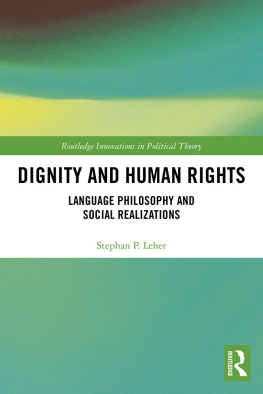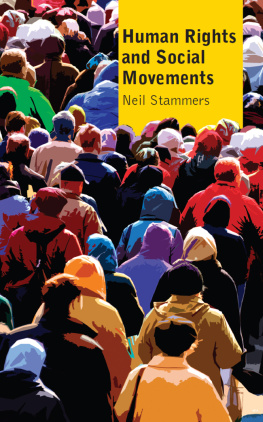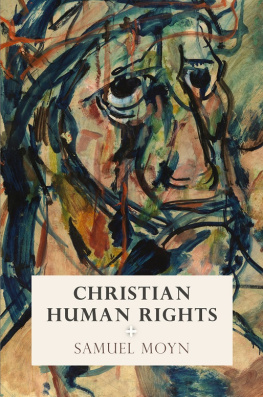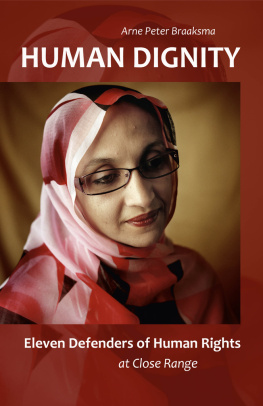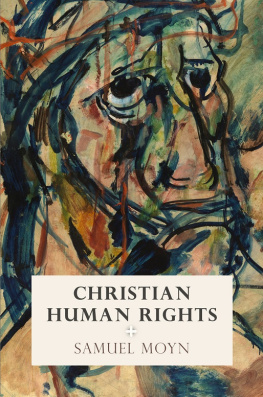Dignity and Human Rights
Stephan P. Leher explains the concept of Human Rights, key to contemporary Political Theory, in a complex and systematic way. The book includes the most recent approaches and is of the utmost interest for different academic disciplines like Philosophy and Political Science, Legal Studies and Theology.
Anton Pelinka, Central European University, Budapest
Is it impossible to assess dignity, which is the faculty or agency of autonomy and equality of rights under the current rule of law, when we are met by global challenges like climate change, financial crisis, food crisis, natural disasters, inequality, violent conflicts and trade disputes?
Drawing on European philosophical enlightenment to rethink dominant theories of contemporary Western Human Rights, Stephan P. Leher explores the philosophical foundation of the concept of dignity and Human Rights. Using specific examples from Africa and Latin America to explain these concepts as social realizations in the world, Leher demonstrates the link between justice and peace and contends that dignity, freedom and Human Rights law rule are social realizations and claims by all people. With the help of language philosophy, he argues that sentences and propositions about social choices and realizations of real life expressed in ordinary language constitute the basic elements of the foundation and protection of human dignity and Human Rights. The social choice to claim ones freedom and rights can be considered the dignity agency of the individual.
Dignity and Human Rights sheds new light on the academic assessment of dignity, the agency of autonomy and the equality of rights under the rule of law, in a time of changes and challenges to Human Rights policies and politics.
Stephan P. Leher is Professor of Moral Theology at the University of Innsbruck, Austria.
Routledge Innovations in Political Theory
For more information about this series, please visit: www.routledge.com/Routledge-Innovations-in-Political-Theory/book-series/IPT
Hegel, Marx, and 21st Century Social Movements
Democracy, Dialectics, and Difference
Brian Lovato
Ideologies of Experience
Trauma, Failure, and the Abandonment of the Self
Matthew H. Bowker
Post-Politics in Context
Ali R?za Takale
Claus Offe and the Critical Theory of the Capitalist State
Jens Borchert and Stephan Lessenich
Equality Renewed
Christine Sypnowich
Rethinking Utopia
Place, Power, Affect
David M. Bell
Hugo Grotius and the Modern Theology of Freedom
Jeremy Seth Geddert
Critical Urban Theory, Common Property, and the Political
Desire and Drive in the City
Dan Webb
Democracy Beyond the Nation State
Practicing Equality
Joe Parker
Reclaiming Representation
Contemporary Advances in the Theory of Political Representation
Edited by Mnica Brito Vieira
Dignity and Human Rights
Language Philosophy and Social Realizations
Stephan P. Leher
A Conceptual Investigation of Justice
Kyle Johannsen
Compromise and Disagreement in Contemporary Political Theory
Edited by Christian F. Rostbll and Theresa Scavenius
Dignity and Human Rights
Language Philosophy and Social Realizations
Stephan P. Leher
First published 2018
by Routledge
711 Third Avenue, New York, NY 10017
and by Routledge
2 Park Square, Milton Park, Abingdon, Oxon, OX14 4RN
Routledge is an imprint of the Taylor & Francis Group, an informa business
2018 Taylor & Francis
The right of Stephan P. Leher to be identified as author of this work has been asserted by him in accordance with sections 77 and 78 of the Copyright, Designs and Patents Act 1988.
All rights reserved. No part of this book may be reprinted or reproduced or utilized in any form or by any electronic, mechanical, or other means, now known or hereafter invented, including photocopying and recording, or in any information storage or retrieval system, without permission in writing from the publishers.
Trademark notice: Product or corporate names may be trademarks or registered trademarks, and are used only for identification and explanation without intent to infringe.
Library of Congress Cataloging in Publication Data
Names: Leher, Stephan, author.
Title: Dignity and human rights: language philosophy and social realizations / Stephan P. Leher.
Description: New York, NY: Routledge, 2018. | Series: Routledge innovations in political theory; 75 | Includes bibliographical references and index.
Identifiers: LCCN 2017010197| ISBN 9781138062962 (hardback) | ISBN 9781351665131 (webpdf) | ISBN 9781351665124 (epub) | ISBN 9781351665117 (mobipocket/kindle)
Subjects: LCSH: Human rightsPhilosophy. | DignityPhilosophy. | Language and languagesPhilosophy. | Agent (Philosophy)
Classification: LCC JC571.L379 2018 | DDC 323.01dc23
LC record available at https://lccn.loc.gov/2017010197
ISBN: 978-1-138-06296-2 (hbk)
ISBN: 978-1-315-16136-5 (ebk)
Typeset in Times New Roman
by Wearset Ltd, Boldon, Tyne and Wear
Contents
Acknowledgments
In Natalja Mortensen I found a Senior Editor who, from the very first text proposal, expressed interest in the topic and the questions I raise in the book. I would like to express my gratitude to her for her firm and discreet expert advice and encouragement throughout the editorial stages of the project. Her arguments were always consistent and committed, getting the best results possible. I would also like to thank Lillian Rand and the editorial and production team at Routledge for their commitment to the project. Special thanks go to Alexis Taylor and Mary Heaney Margreiter, whose commitment, high standard of professionalism and experience ensured a text one wants to read. I also want to express my thanks to Monika Datterl for her significant help in producing a well-organized manuscript that is ready for the production process.
Introduction
There is a link between justice and peace. This book is based on the conviction that dignity, freedom and the rule of Human Rights law are social realizations of claims made by the individual woman, man and queer. The social choice to claim ones freedom and rights can be considered the dignity agency of the individual.
At the end of the twentieth century, some optimists claimed that Western liberal democracy had finally been shown to be the definitive role model for the universal homogenous state. At the same time, looking at the worlds nuclear arsenal and ecological disasters, pessimists claimed that todays nation states are not able to secure peace, to stop men and women from polluting the biosphere and to maintain the planets irreplaceable and indispensable resources ().
There are also women, men and queer who simply seize the opportunities afforded by history to advance in the direction of justice and world peace. In 1798, Immanuel Kant claimed that the principles of a good and just republican constitution should avoid war, the source of all evil and corruption of morals (Gregor 1979: xxvi). In November 1945, the Nuremberg International Military Tribunal held the first trial in history for crimes against world peace. Robert H. Jackson, as Chief of Counsel for the United States at the Nuremberg Trial, insisted in his opening statement that Nazi criminals be brought to justice according to the rule of law. He was also clear about the fact that justice needs a polity of laws that assists nations to stay on the side of peace. Historically, this polity often has been initiated by the governments of individual democratic states. In 1945, Jackson had the courage and wisdom to also address the United Nations as responsible partners on the way to a world peace polity ().

